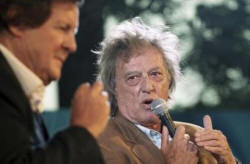|
 Stoppard's
new play lifts the lid on brain science Stoppard's
new play lifts the lid on brain science
 Send a link to a friend
Send a link to a friend
[January 30, 2015]
By Ben Hirschler
LONDON (Reuters) - Tom
Stoppard, the grand old man of British theater, is back
with his first new stage play in nine years, tackling
typically big ideas: consciousness, science and God.
|
|
 "The Hard Problem" is a 100-minute gallop, with no interval,
through neurobiology, religion and improbable "black swan"
events in financial markets that is both contemporary and
timeless. Along the way there are tales of altruistic vampire
bats and some good jokes. "The Hard Problem" is a 100-minute gallop, with no interval,
through neurobiology, religion and improbable "black swan"
events in financial markets that is both contemporary and
timeless. Along the way there are tales of altruistic vampire
bats and some good jokes.
While the play fizzes with ideas it is arguably less successful
as a human drama, and reviews of the production at the National
Theatre's intimate Dorfman venue in London were mixed on
Thursday.
Still, a new Stoppard play is always an event and there are few
tickets left until April, when it will be broadcast live to
hundreds of cinemas around the world.
Ideas are always central for the 77-year-old Czech-born author,
who was named the "greatest living playwright" at the Evening
Standard Theatre Awards last year for half a century of work
ranging from stage plays like "Rosencrantz and Guildenstern Are
Dead" and "Arcadia" to the movie "Shakespeare in Love".

The audience gets fair warning it is in for an intellectual
workout this time, from a program that features letters between
Stoppard and evolutionary biologist Richard Dawkins on Cartesian
dualism, or the separation of mind and matter.
The set hammers home the point, too, with LED lights firing like
neurons over the action below.
The opening scene plunges straight into a debate on game theory
between two lovers, representing opposing views on whether
consciousness is more than the mechanistic activity of molecules
-- a question described by philosopher David Chalmers as "the
hard problem".
[to top of second column] |
 The story centers on one of them, a semi-religious psychology
researcher called Hilary, who gets a tough message on the
materialist realities of modern brain research from her
tutor-lover Spike.
"If you want something cuddly, try business studies," he tells
her, as she prepares for an interview at the “Krohl Institute for
Brain Science”.
Spike is an archetypal Darwinian reductionist, renaming Raphael’s
Madonna and Child as “Woman Maximising Gene Survival”.
Straddling the scientific cut-and-thrust is hedge fund manager Jerry
Krohl, the institute's founder, who is fascinated by how
neuroscience meshes with the herd psychology behind financial
markets.
And tying the plot together is a tale of Hilary's absent child,
which is finally resolved in a plot twist that is either a highly
unlikely coincidence or a "miracle", depending on where the viewer
stands on the atheism-religion curve.
Stoppard's play does not ultimately answer the hard problem, which
is no great surprise, given the uncertainty among scientists as to
whether the human brain is actually complex enough ever to
understand itself.
(Editing by Michael Roddy and Andrew Roche)
[© 2015 Thomson Reuters. All rights
reserved.] Copyright 2015 Reuters. All rights reserved. This material may not be published,
broadcast, rewritten or redistributed. |